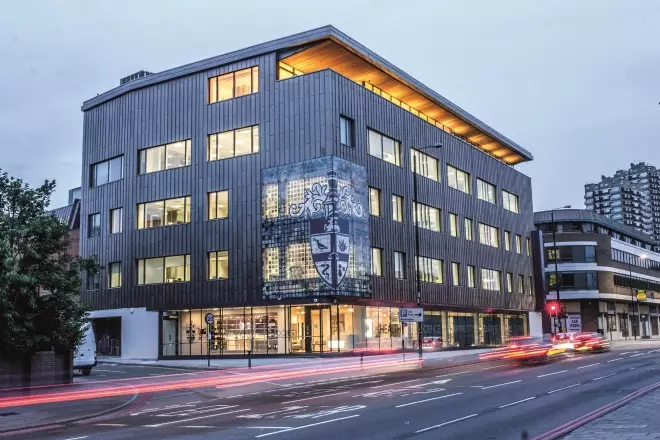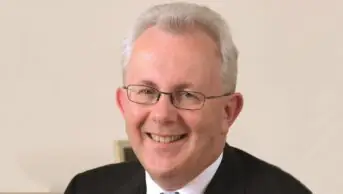
Royal Pharmaceutical Society
Recently, several members and Fellows of the Royal Pharmaceutical Society (RPS) have expressed their view on social media, and other forums, that the RPS should actively be on a path to become a royal college.
Since 2017, when I was appointed chief executive officer at the RPS, I have been aware that the prospect of the Society becoming a royal college was still a subject of discussion, and that various presidents and RPS Assemblies have held differing views on this unresolved issue. Soon after being appointed, I asked our in-house legal team to look further into the matter with a view to commissioning external legal advice on seriously exploring the steps required to become a royal college (which I will cover later).
Elected members have expressed strong views to me that the RPS should become a royal college if the Society is to be recognised as an equal to the medical royal colleges — such as the Royal College of General Practitioners (RCGP) and the Royal College of Physicians (RCP) — and have a recognised role in professional education and development. Equally, I have also heard strongly expressed views that the RPS, as a Society incorporated by royal charter, should be proud of being an eminent professional body and ‘learned society’ with a much wider remit than the name ‘college’ may imply. A phrase often used in discussions is that the RPS is ‘akin to a royal college’ while being a Society that is blessed with royal patronage. The RPS is already able to function in the capacity of a royal college as it stands, and any change in name, and legal entity that might accompany it, is unnecessary.
The RPS Assembly, as the Society’s main governing body, considered a possible journey towards being called a royal college when developing its strategic objectives in the months prior to the launch of the new five-year RPS strategy in 2021. In the end, RPS Assembly did not rule out the prospect of ever finalising the changes necessary to become a royal college, but it did decide that it was not among its most immediate priorities.
Readers may agree or disagree with the conclusion reached by RPS Assembly, but I wanted to use this article to help readers further understand the issues it considered in reaching this conclusion, so that members and Fellows are able to decide for themselves the merits of such a position or otherwise, particularly given recent commentary.
Becoming a professional body
Before turning to the main points of consideration, it is worth referencing that prior to development of the most recent strategy, there have been several opportunities for various governance structures of the Society over its 180-year history to have sought to become a royal college, but none have been taken.
The Society was first incorporated by royal charter when granted in 1843 and a supplemental charter was granted in 1953 to enable the Society to perform its regulatory functions. In more recent times, the period when RPSGB was transitioning from a combined regulator and professional body to today’s RPS provided another significant opportunity.
At that time (2010), the royal charter was further amended and various references to the regulatory function of the Society were removed. Again, no change of name was sought, and I cannot find any reference to this in any of the papers available to me that were discussed by the transformation committee (TransCom) that oversaw this period of change. If they do exist, it is also worth mentioning that any ‘agreement’ reached that did not find its way into either an amended royal charter or into RPS regulations, would not bind any subsequent RPS Assembly, which is free to make its own decisions, provided it observes the relevant governance requirements.
The current amended supplemental royal charter revokes the 1953 supplemental charter and today the ‘objects’ of the Society are:
- To safeguard, maintain the honour, and promote the interests of pharmacists in their exercise of the profession of pharmacy;
- To advance knowledge of, and education in, pharmacy and its application, thereby fostering good science and practice;
- To promote and protect the health and wellbeing of the public through the professional leadership and development of the pharmacy profession; and
- To maintain and develop the science and practice of pharmacy in its contribution to the health and wellbeing of the public.
It is also worth noting that the previous RPS strategy (2016–2021) made reference to acting as royal college but not to becoming one. I understand that this wording was carefully chosen. The phrase ‘being the royal college for pharmacy’ was used in strategic objective number one about improving the public’s health and wellbeing.
Royal college status
So, what are the main points for consideration? First, understanding what a royal college is seems the most sensible place to start.
Used often in the context of health professional bodies, these are institutions that have royal patronage, take a name with the word ‘college’ in the title, and have their position recognised through the grant of a royal charter. This is made using the royal prerogative, therefore by the sovereign, on advice of the Privy Council. It is not granted lightly, and incorporation by a royal charter (as the RPS is today as a royal society) is a prestigious way of acquiring legal personality. The royal charter describes the constitution of the society and conveys other legal privileges and obligations. The ability to use the title ‘royal’ does not come from the royal charter itself but is granted by the Royal Names Team of the Constitution Group of the Cabinet Office. The medical royal colleges can confer post-nominal titles in the same way that the RPS does.
When developing the RPS 2021–2026 strategy, RPS Assembly was specifically asked if the Society should be actively pursuing a change to become a royal college as part of the five-year strategy. It was agreed that as there was no current impediment to our ambitions in education, or any other ambition, that our existing charter prohibited, and no material benefit of a change in name (or perceived status) to royal college identified, that for the life of the five-year strategy this would not be pursued. RPS Assembly was also clear that it continued to recognise the importance of the role in education that the RPS has and intends to develop through its many activities, including curricula development, assessment and credentialing, and in continuing professional development.
Legal advice
In reaching this conclusion, RPS Assembly considered the advice provided in 2018 by our in-house general legal counsel at the time, which was informed by expert external legal opinion. This had set out the lengthy and uncertain formalities required to amend the Society’s current royal charter (I will detail this advice below), but also identified two steps that are required before any application to change the royal charter should be considered.
The first of these was the development of a sustainable educational arm – which has been a focus since I joined the RPS; education and its importance to the Society’s membership proposition, its future viability and sustainability is a major consideration currently. The second main observation from our advisers was that royal colleges are now typically expected to be registered charities.
For the RPS to secure charitable status, it would involve corporate reorganisation with several ramifications, most notably around the creation of charitable ‘objects’ with a public benefit. Any charity must be run for the public benefit and comply with charity law as regulated by the Charity Commission. This is not to be confused with object (3) in the royal charter about promoting and protecting the health and wellbeing of the public through the professional leadership and development of the pharmacy profession, but this could be in conflict with object (1) which relates to promoting the interests of pharmacists in the exercise of the profession of pharmacy – perhaps readily recognisable as the core responsibility of a membership body.
Repositioning the role of a membership body in favour of elevating a clear charitable public benefit would be an irreversible step that members would need to agree at the right time before seeking royal college status. As a professional leadership body, the RPS has been on a journey to improve patient care through a strong pharmacy profession since the demerger from the regulator in 2010, but RPS Assembly felt the time had not yet arrived for the necessary discussions with the Charity Commission and the subsequent and significant procedural steps to allow this to be finalised as part of the five-year strategy.
Long and costly process
Even once a sustainable educational arm has been established and the RPS is ready to make the irreversible step of becoming a registered charity, there are various procedural steps that the RPS would need to undertake to finalise a change to a royal college, which have significant time and resource implications and no guarantee of success:
- Gain member approval (as per governance requirements), through a ‘special resolution’ vote, to seek to amend the royal charter to remove and/or amend the primacy object of advancing and supporting members and replace it with the objective to support and advance public health. A two-thirds majority of voting members would be required.
- Seek Privy Council approval for amendment of the existing royal charter objects to achieve charitable status and to be recognised as a royal college. There are four stages for charter amendment (three of which are informal and thought to be lengthy). There is no guaranteed outcome or timescale.
- Consider and implement actions needed to reorganise profit-making internal functions into trading subsidiaries of the main charity, including actions required to align the educational arm of the society in line with other royal colleges.
- Seek permission to obtain authorisation from the Cabinet Naming Office for a new name, which would also meet with the agreement of the membership. Various names have been ‘floated’ in the past by those favouring such a change.
- If agreement is reached to change name and to become a charity, then resources would be needed to rebrand the RPS and this would add to the financial burden of undertaking such an exercise.
When obtaining legal advice, it was pointed out to the RPS that there is no difference in the legal entity rights between a royal college and a royal society. From a legal perspective, the only difference is branding and any perceived status benefits one may carry, which the other may not. It was also noted that there was a risk, however small, that Privy Council could choose to revoke the existing charter if a further application for amendment is made.
The financial implications for the RPS to proceed with a petition to Privy Council (with Her Majesty The Queen present), in a way that minimised all risks and maximised the chances of success, would incur legal fees and in-house resource costs over several hundreds of thousands of pounds. At a time when the RPS still provides the covenant to the old RPSGB pension fund (as was required as part of the restructuring arrangements in 2010, and currently amounting to annual contributions of £700,000 per year as the scheme moves towards achieving its ultimate aim of buy-out) and with ambitions to grow its education and membership offer further, this was thought by the Assembly to be a poor time to undertake such activity and burden the organisation and membership with the associated cost.
Perceived status
Finally, the point about perceived prestige of being called ‘royal college’ rather than ‘royal society’ was considered. While some may find the perceived prestige attractive, there is also a risk that others may find it alienating or even that it would be seen as a move to be ‘elitist’. Also, some may argue that to be content to be recognised as a learned society suggests the RPS is a confident organisation, proud of its ability to be a society of like-minded individuals and able to bring together a community of people having common professional interests, who can join at whatever their career stage or professional position or ‘status’.
During the development of the most recent RPS strategy, it was noted that work was already under way with many other royal colleges to further our mission and vision, such as the collaboration with various royal colleges on medicine safety webinars, the work with RCGP on delivering training for the Community Pharmacist Consultation Service and our links with royal colleges in important areas, such as the development of our education offer (e.g. the consultant pharmacist curriculum). The RPS also frequently collaborates with members of the Academy of Medical Royal Colleges in all three nations, as well as other professional societies, such as the Royal Society for Public Health, Royal Society of Chemistry and others that have their foundation in science.
Taking all of this into consideration, RPS Assembly decided that the Society should put its efforts into delivering the seven strategic goals agreed in the current strategy rather than put time, effort and financial commitment into converting to a royal college, but it has not ruled that prospect out in the development of any future strategy.
10 comments
You must be logged in to post a comment.



Thank you, Paul. A clear, thorough explanation of the issues.
Thanks. That’s helped me to understand where we are and it seems, in my opinion, that the RPS Assembly made a sensible decision.
A further thank you Paul and further support for the Assembly's decision.
Charity status was considered by the RPSGB Council more than once in the past and rightly rejected for limiting the Society's ability to promote pharmacists and the profession. There is nothing that the Society cannot do now that would be achieved by College status, and much that could be lost.
I agree Nick on Charity and College status and don’t think they are the way forward but think the two issues are separate. See below.
I am not convinced the Society is any nearer to operating as a body akin to Royal College than it was in 2010. In many ways things seem to have regressed somewhat.
Take care
The article shares the RPS Assembly's thinking as to why conversion was not pursued, but considerably less detailed insight of the actual benefits that Royal Colleges enjoy. I wonder if colleagues who support college status can fill in the gaps?
Organisational transition is by its nature complex, but the pain of change alone is not a primary reason not to do something. I read that the RPS is not ready for this yet; what would tip the balance in favour of the college status?
As a former Transcom member who supported the idea of a Royal College I was interested to see Mr Bennett’s perspective on this recent decision taken it seems without membership debate.
Sadly my notes were shredded years ago but I hope these thoughts may offer a way forward.
From memory the old dual role RPSGB was deemed unfit for purpose and it was suggested the profession needed a professional body akin to a Royal College. NB not necessarily a Royal College per se. Transcom felt the RPS without its regulatory role could do that by engaging more with other pharmacy professional bodies.
I therefore reviewed how many of the Royal colleges ran to see what they offered and think I wrote to the PJ, but I cannot find anything I wrote before 2012 on the website. From memory I noted the following:-
They set standards for practice and qualifications beyond those needed for professional registration with the regulator.
They worked with the regulator on ensuring these met service needs.
They supported members though training, publications, examinations, libraries etc
Students could join for free or nominal sums
Membership level was focussed on training grades with fees often linked to salary growth to help younger members join and progress.
Fellowship was the aim after 8- 10 years or so and there were clear routes to gain that membership level often linked to a NHS Consultancy or GP status that were open to all.
Most provided free continuing membership/fellowship to those over 70 or 75 thereby retaining their expertise for future generations, and enabling them to continue within their social and professional networks.
The Colleges were run by elected Fellows with input from some elected members and students.
I agree with the conclusion the new RPS does not need to try to become a Royal College. It could however move to operate much more like a Royal College than it does now.
Our Fellows system needs a radical rethink. When I became one around 1991 I wrote thanking the President and asked what I might do to help the profession, but got no answer
I have no idea how many members or Fellows the Society has now but suggest the balance needs to change.
I am long retired and have gradually become disengaged, I am not into social media
so I’m not clear what the Society can do or is doing to identify develop or improve standards that employers or regulators want.
The Society might wish to commission research to see what employers and the regulator want from it and to investigate how Royal Colleges now work to see what can be done to mirror or improve as many of these roles and organisational arrangements as possible within the RPS without trying to become a College or Charity.
Regards
Howard McNulty.
A couple more things came to kind.
I mentioned Royal Colleges as did others in Transcom and I raised the idea of free membership for the over 70s to help retain expertise and give loyalty some reward. This caused a horrified reaction from RPSGB representatives, largely I think because of the enormous costs of providing and posting weekly Journals for nothing. Now that cost has gone, maybe it’s time to revisit that idea.
Mr Bennett refers to no name change being sought. Transcom suggested the then RPSGB should be rebranded to lose “the unfit for purpose label” and the simplest solution was by dropping GB from the title.
I think it would be worth contacting Nigel Clarke who chaired Transcom and then led GPhC to see if he can shed any light on what the Society might do going forward and for any thoughts on the past.
Asking members might even be worth undertaking too.
Thank you Paul for a clear explanation of the issues.
Would have been nice to have had some response or private contact from Mr Bennett or someone in HQ to my comments, but like other responses submitted to other consultations or requests for ideas, nothing happens.
I won’t bother any more.
Happy New Year